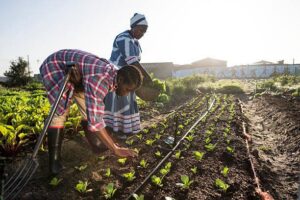By Ori Marian Enyinnaya and Opara Joy

Agriculture in Nigeria is more than just an economic activity. It is a legacy, a deeply rooted cultural practice passed down through generations. Each ethnic group has developed unique farming techniques, shaped by geography, environment and ancestral wisdom. The Hausas are renowned for their expertise in livestock rearing and rain-fed farming. The Yorubas have mastered mixed farming that balances commercial and subsistence agriculture. The Igbo sustain small-scale, family-driven farms focused on staple crops like yam, cassava, and maize.
These traditional practices have long preserved biodiversity, ensured food production, and strengthened community ties. However, as global food demands rise and technology reshapes agricultural landscapes, Nigeria faces a crucial dilemma: are ethnic farming traditions a barrier to progress, or do they hold the key to a sustainable future?
The Nigerian agricultural sector remains a significant contributor to the economy, accounting for 28.65% of the GDP in the third quarter of 2024. Yet, despite this substantial contribution, food imports continue to rise, highlighting inefficiencies within the sector. The push for modern agricultural techniques (mechanization, improved seeds, precision farming and scientific soil management) offers promising solutions. However, the transition has been far from straightforward.
For many farmers, agriculture is more than a livelihood; it is an identity. Traditional techniques, refined over centuries, are deeply ingrained in their way of life. The introduction of modern methods often clashes with cultural beliefs, making adoption slow and sometimes resisted. Economic barriers further complicate the shift as many smallholder farmers lack the resources to invest in advanced farming equipment, irrigation systems and fertilizers, making large-scale modernization an uphill battle.
Beyond financial constraints, intra-ethnic traditions influence land ownership and farming practices, creating structural barriers to innovation. In many Nigerian communities, land is inherited rather than purchased, making it difficult for younger farmers to acquire large farming spaces suitable for mechanized agriculture. Additionally, skepticism towards external influences often stifles change, as indigenous farming communities perceive modern techniques as foreign and potentially disruptive to their way of life.
The result is a sector caught between two worlds; one that honors the past and another that demands adaptation to a rapidly evolving future. While some advocate for complete mechanization, others argue that abandoning indigenous practices could lead to loss of biodiversity, soil degradation and cultural disconnection.
Rather than framing tradition and modernity as opposing forces, some Nigerian farmers are integrating indigenous wisdom with scientific advancements. The concept of agroecology, which is an approach that merges traditional knowledge with ecological and technological solutions, is gaining traction. By blending time-tested practices like intercropping and organic fertilization with precision farming and irrigation technology, farmers can enhance productivity without erasing cultural heritage.
Government programs and Non-Governmental Organizations (NGOs) are also stepping in, providing training and financial support to help small-scale farmers modernize at their own pace. These initiatives aim to strike a balance—preserving traditional farming methods while introducing innovation where necessary.
The future of Nigeria’s agricultural sector lies in reimagining progress. Modernization does not have to mean abandoning cultural identity. Instead of forcing a choice between the old and the new, a more effective approach would be to foster a farming system that respects ethnic traditions while leveraging innovation to improve food security and economic growth.
If Nigerian farmers can shift the narrative from resistance to adaptation, agriculture can evolve into a sector that honors its roots while securing its future. The real challenge is not just technological, it is about changing perceptions, restructuring land policies, and ensuring that progress is both inclusive and sustainable.
As the global agricultural landscape continues to evolve, the question remains: Can Nigeria craft a farming model that respects its rich heritage while embracing the advancements necessary for a thriving future? The answer, ultimately, lies in the hands of the farmers themselves.
